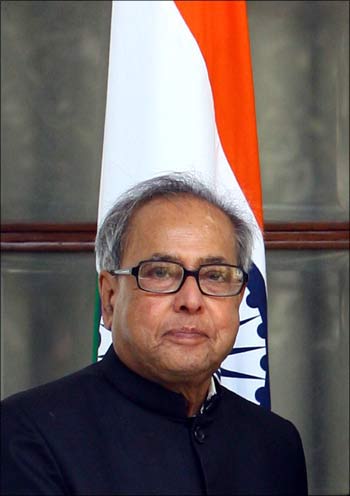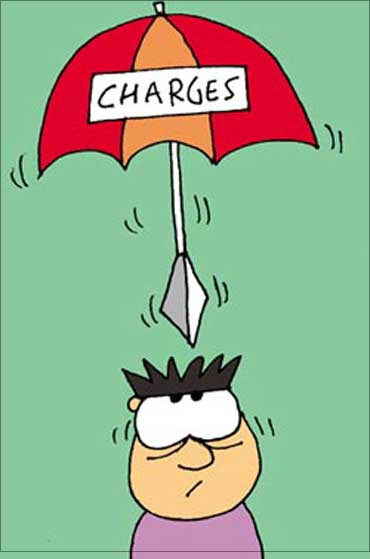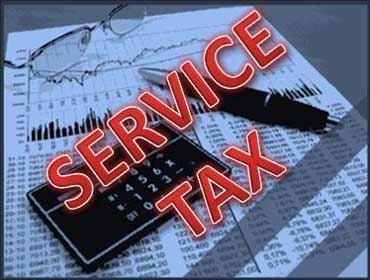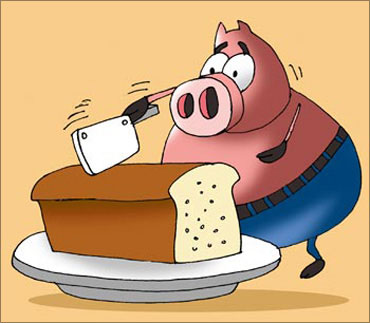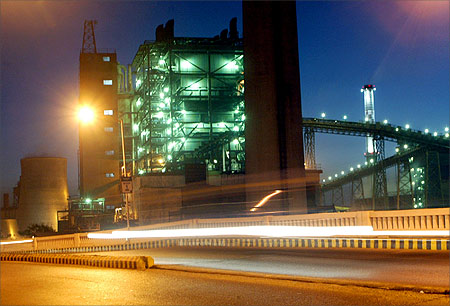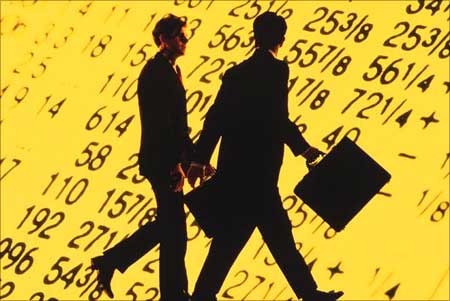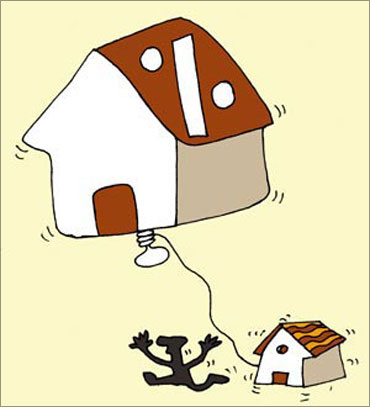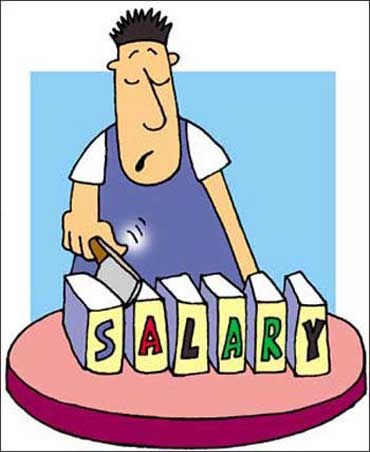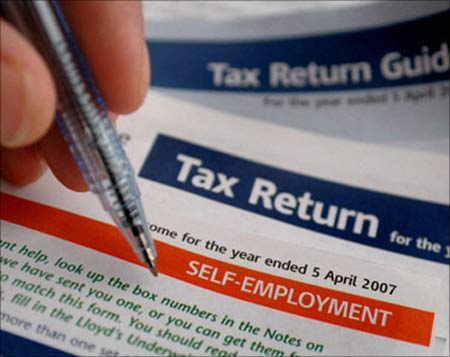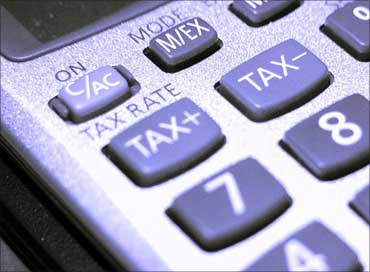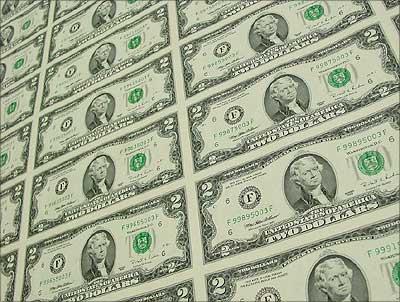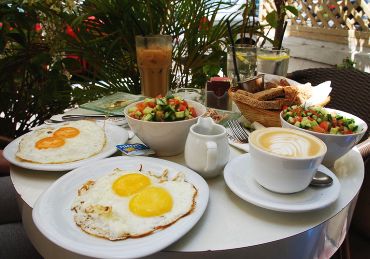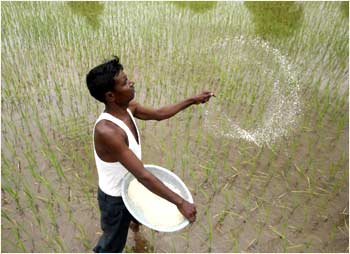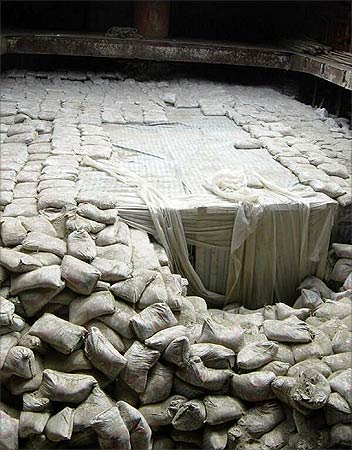 | « Back to article | Print this article |
All about the new tax proposals
Finance Minister Pranab Mukherjee's Budget had quite a few tax-related proposals, although initially they did not appear to be too significant. However, read on to find out what are the proposals related to Direct and Indirect taxes that he has made and how the two affect you!
To bring tax rates closer to Direct Taxes Code rates, the exemption limit for the general category of individual taxpayers has been raised from Rs 160,000 to Rs 180,000.
The increase in the basic exemption limit by just Rs 20,000 for individuals -- from Rs 1.6 lakh (Rs 160,000) to Rs 1.8 lakh (Rs 180,000) -- is hardly substantial.
This translates into a saving of just Rs 2,060 across income groups. Similarly, the increase in the exemption for senior citizens -- from Rs 2.4 to Rs 2.5 lakh (Rs 240,000 to Rs 250,000) -- is even smaller, at just Rs 10,000. The net tax benefit is only Rs 1,030.
The exemption for women has not been changed and remains at Rs 1.9 lakh (Rs 190,000).
Click NEXT to read on . . .
All about the new tax proposals
Senior Citizens should be a happy lot after the Budget. After meeting their long-standing demand of making 60 as the defining age of senior citizens, the finance minister has also introduced a special category -- 'very-senior' -- for citizens over the age of 80, perhaps in tune with the rising life expectancy.
The basic exemption limit for this new category will be Rs 5 lakh (Rs 500,000), double than that for senior citizens.
Earlier, while the retirement age of a person was 60, the tax benefits came only at the age of 65.
Very-senior citizens with a taxable income of Rs 3 lakh (Rs 300,000) stand to benefit. Between incomes of Rs 3 lakh (Rs 300,000) and Rs 50 lakh (Rs 5 million), the benefit is between Rs 6,180 and Rs 26,780.
This is over and above the benefit they would get as senior citizens.
Following is the table of new income tax slabs proposed by Finance Minister Pranab Mukherjee in Budget 2011-12.
| For MEN | |
| Income | Tax Rate |
| Up to Rs 1,80,000 | NIL |
| Rs 1,80,001 to Rs 5,00,000 | 10 per cent |
| Rs 5,00,001 to Rs 8,00,000 | 20 per cent |
| Above Rs 8,00,000 | 30 per cent |
| For WOMEN | |
| Income | Tax Rate |
| Up to Rs 1,90,000 | NIL |
| Rs 1,90,001 to Rs 5,00,000 | 10 per cent |
| Rs 5,00,001 to Rs 8,00,000 | 20 per cent |
| Above Rs 8,00,000 | 30 per cent |
| For SENIOR CITIZENS (from 60 yrs to 80 ys in age) | |
| Income | Tax Rate |
| Up to Rs 2,50,000 | NIL |
| Rs 2,50,001 to Rs 5,00,000 | 10 per cent |
| Rs 5,00,001 to Rs 8,00,000 | 20 per cent |
| Above Rs 8,00,000 | 30 per cent |
| For VERY SENIOR CITIZENS (80 years and above) | |
| Income | Tax Rate |
| Up to Rs 5,00,000 | NIL |
| Rs 5,00,001 to Rs 8,00,000 | 20 per cent |
| Above Rs 8,00,000 | 30 per cent |
Click NEXT to read on . . .
All about the new tax proposals
Tax on ULIPs
If you use life insurance as an investment instrument, be prepared for slightly lower yields because of increased taxation.
On traditional insurance plans, the finance minister has increased the amount on which service tax is levied. Earlier, the customer paid service tax on 1 per cent of the premium. From the next financial year, this will go up to 1.5 per cent.
For example, if you paid an annual premium of Rs 10,000, the service tax (of 10 per cent) was charged on Rs 100. Now, the tax will be charged on Rs 150. "These will be adjusted in the premiums and accordingly the yield will fall," said a senior official of a life insurance company.
Traditional products include moneyback policies and endowment plans.
Click NEXT to read on . . .
All about the new tax proposals
Similarly, the finance minister has also brought all unit-linked insurance plan (Ulip) charges under the gamut of service tax.
Until now, only mortality and fund management charges were subjected to service tax.
This means, policy administration charge and policy allocation charge, too, would come under the service tax net.
However, the insurers were waiting for the finance minister to clarify on the continuation of the exempt-exempt-exempt (EEE) tax regime on life insurance products once the Direct Tax Code is implemented from April 1, 2012.
Click NEXT to read on . . .
All about the new tax proposals
Lower penalty, higher interest for late payment of service tax
If you are providing any taxable service, you are in for some changes in penalties on late payment of service tax.
The penal provisions of Sections 76, 77 and 78 of the Finance Act, 1994, have been changed a bit. Section 76 for penalty on late payment of service tax will charge an additional one per cent a month or Rs 100 a day, whichever is higher.
Till now, the penalty was higher of two per cent a month or Rs 200 a day. The penalty can be a maximum 50 per cent of the tax.
The interest on late payment is up at 18 per cent from 13 per cent. For those with a turnover of Rs 60 lakh (Rs 6 million), the applicable interest will be three per cent lower, at 15 per cent.
Click NEXT to read on . . .
All about the new tax proposals
In case of a proper reason for late payment, the penalty can be waived off under Section 80.
Section 78 covers penalty on late payment of service tax due to fraudulent reasons. The penalty has been made compulsory and equal to the tax evaded.
If you pay the tax in a month's time from the last date with interest, the penalty will be 25 per cent as against 50 per cent. If you have a turnover of Rs 60 lakh in any year, this one month will be increased to 90 days.
Section 77 for penalty for contravention of any rule for which there is no penalty mentioned, will charge Rs 10,000 as against Rs 5,000.
For instance, there is a format for printing an invoice, but you do not follow it, it is viewed as a contravention.
Delay in service tax filing will attract a penalty of Rs 20,000 from Rs 2,000 now.
Click NEXT to read on . . .
All about the new tax proposals
Tax benefit for infra bonds extended
Besides these exemptions, the Union Budget has continued with the benefit of Rs 20,000 for infrastructure bonds under Section 80 CCF.
The additional deduction of Rs 20,000 for investment in long-term infrastructure bonds, notified by the Central government in 2010-11, has been extended for one more year.
Click NEXT to read on . . .
All about the new tax proposals
Corporate tax surcharge cut
The finance minister had a mixed bag for India Inc. There was no across-the-board rise in the Cenvat rate from 10 per cent, as was feared.
The surcharge of 7.5 per cent on domestic companies has been reduced to 5 per cent. The rate of Minimum Alternate Tax has been raised from 18 per cent of book profits to 18.5 per cent, to keep the effective rate of MAT at the same level.
MAT will be levied on developers of Special Economic Zones as well as units operating in SEZs.
Indian companies with foreign subsidiaries had a lot to celebrate, as their dividend earnings would now be taxed at a lower rate of 15 per cent.
Click NEXT to read on . . .
All about the new tax proposals
Lower tax on dividends from foreign arms
For the year 2011-12, dividends received by an Indian company from its foreign subsidiary will be taxed at a lower rate of 15 per cent, to provide these funds an incentive to flow to India.
Tax breaks for investment in housing
Businesses which develop affordable housing under a scheme to be notified will be allowed an investment-linked deduction.
Click NEXT to read on . . .
All about the new tax proposals
Salaried people with Rs 5 lakh income need not file returns
In a big relief from cumbersome tax filing process for the salaried class, Finance Minister Pranab Mukherjee on Monday proposed to exempt them from filing tax returns unless they have other sources of income.
The government will be issuing a notification exempting 'classes of persons' from the requirement of furnishing income tax returns, said the Memorandum to the Finance Bill 2011.
Salary earners having an income of less than Rs 5 lakh will not have to file tax returns from this year.
"Salaried people, may be up to Rs 5 lakh...they need not file the (income tax) return," CBDT chairman Sudhir Chandra said.
The exemption from filing tax returns come into effect from the assessment year 2011-12. The decision, which will come into effect from June 1, 2011, will reduce the compliance burden on small taxpayers, it added.
In case such a salary earner has income from other sources like dividend, interest etc. and does not want to file returns, he will have to disclose such income to his employer for tax deduction, Chandra said.
The Form 16 issued to salaried employees will be treated as Income Tax Return, he added.
Click NEXT to read on . . .
All about the new tax proposals
After Saral, it's time for Sugam
Filing income tax returns in the coming assessment year should be a much simpler task for small taxpayers.
Introducing a form similar to the 'Saral' form, Finance Minister Pranab Mukherjee introduced 'Sugam' in his Budget speech on Monday.
Sugam, the Hindi word for accessible, is a simplified form that aims to reduce the compliance burden of taxpayers like small businesses and professionals.
But this is just one of the many tax administration measures announced by the FM to make taxation procedures more efficient.
The objective seems to be to get the system aligned to the web platform, with several initiatives being worked out to popularise e-filing of returns and e-payment of taxes.
Click NEXT to read on . . .
All about the new tax proposals
INDIRECT TAXES
130 items brought under Central excise duty
Of the 370 items that enjoy exemption from Central excise duty but are chargeable to VAT, 130 that are mainly in the nature of consumer goods will be subject to a nominal Central excise duty of 1 per cent. Basic food and fuel will continue to be exempt.
The remaining 240 items will be brought into the tax net when GST is introduced.
Peak Customs duty remains 10%
Peak customs duty will be retained at 10 per cent, in view of continued uncertainties in the global economy.
However, some rationalisation is being done to unify three rates namely, 2 per cent, 2.5 per cent and 3 per cent at the middle level of 2.5 per cent.
Lower excise duty rate raised
To keep in step with states, most of whom have increased their merit rate of VAT from 4 per cent to 5 per cent, the lower rate of Central excise duty has been increased from 4 per cent to 5 per cent.
Click NEXT to read on . . .
All about the new tax proposals
Good life will come at a higher price
If travelling is your idea to unwind, finding solace could be more expensive from the new financial year. From April 1, you will need to pay extra tax on airfare, hotel room and drinking at an air-conditioned restaurant.
For hotel rooms, a person will pay 5.15 per cent service tax on the tariff. This is applicable only to hotels with room rents of 1,000 or more for a day.
Here's how it works: the finance minister has said there will be service tax (of 10 per cent) on room tariffs. However, he has offered 50 per cent abatement on charges. This means, if you pay 5,000 for a room, 10 per cent service tax will be levied on 2,500.
Suppose you book a room costing 5,000 and the state's luxury tax is 10 per cent, you will end up paying over 750 in taxes. Of course, the food that you order from the room will not attract this double taxation. It will only be charged a value added tax of around 5 per cent, depending on the state.
You actually start paying more tax right at the start of the journey -- when you fly to the destination. On the domestic airfare, the service tax has been increased by 50 for economy class.
Currently, fliers pay a service tax of 100. From the new financial year, they will shell out 150. Similarly, for international travel, the tax on tickets has been increased to 750 from the present 500 on economy class.
Click NEXT to read on . . .
All about the new tax proposals
If you prefer the comfort of premium class while flying, it could be a bit disturbing to learn that the service tax on the domestic premium class (business and first class) has shot up from just 100 to straight 10.3 per cent.
However, there is no clarity whether the person needs to pay this tax on the basic fare or the overall ticket price.
You need to watch out for your drinks, too, because drinking liquor in air-conditioned restaurants has become expensive by three per cent. The finance minister said that 10 per cent service tax would be introduced in restaurants, with abatement of 70 per cent. This will be in addition to VAT of around 20 per cent, which most state levy.
These services have been brought under the service tax net because the finance minister feels that the "actual collections of service tax do not reflect the full potential of this sector".
Click NEXT to read on . . .
All about the new tax proposals
Expensive breakfast, cheaper medicines
By adding 130 items such as, coffee, tea, ready-to-eat packaged foods and ketchups, the Budget has hiked expenses further.
The Budget has reduced the basic Customs duty on raw pistachios and cranberry products from 30 per cent to 10 per cent and on raisins from 100 per cent to 30 per cent.
However, households do stand to gain from indirect benefits of Customs duty cuts on certain medical products.
It has been dropped from 10 per cent to five per cent on some life saving drugs. Similarly, the Customs duty has been reduced from 25 per cent to 10 per cent on the lactose used in the manufacture of homeopathic medicines.
Further, in a move to bring more items under the tax ambit, the Budget has imposed an excise duty of one per cent on 130 specified items, which were exempt from the tax till date.
These include consumables like coffee, tea, sauces, ketchups, soups, broths, all kinds of food mixes, ready-to-eat packaged foods and milk containing edible nuts with sugar. At the same time, the excise duty on other essentials like sanitary napkins, baby and adult diapers has been brought to one per cent from the existing 10 per cent.
Click NEXT to read on . . .
All about the new tax proposals
Excise on ready-mades mandatory
Branded ready-made garments and made-ups of textiles, currently under an optional excise duty regime, will be subject to a mandatory levy at a unified rate of 10 per cent.
Mobile phones to cost more
Mobile handset prices will become more expensive as Finance Minister Pranab Mukherjee on Monday announced one per cent hike in the Central Excise duty for 130 items, including phones.
Come April 1 and central excise duty on mobile phones will be raised from the current four per cent to five per cent.
The Budget has made some items, including raw materials for syringe and needles, mobile parts and accessories like hands free headphones, incense sticks, sanitary nakpins and diapers, cheaper by reducing taxes.
Steel prices to come down. Items that will become cheaper also include solar lanterns.
The proposals made by Finance Minister Pranab Mukherjee also mean that ready-to-eat food items, such as ketchups, soups, mudis (puffed rice), coffee and tea mixes, flavoured milk, supari will be dearer as they will now attract higher excise duty.
Click NEXT to read on . . .
All about the new tax proposals
Boost for cold chain equipment
Full exemption from excise duty is being extended to air-conditioning equipment and refrigeration panels for cold chain infrastructure. Conveyor belts used in cold storages, mandis and warehouses will also be fully exempt from excise duty.
Customs duty on farm machinery cut
The basic customs duty of 5 per cent on specified agricultural machinery has been reduced to 2.5 per cent. The concession is also being extended to parts of such machinery to encourage domestic production.
Click NEXT to read on . . .
All about the new tax proposals
Customs duty on raw silk cut
To encourage domestic value addition vis-a-vis imports, the basic customs duty has been reduced on raw silk; certain textile intermediates and inputs for chemicals, ferro-alloys and paper; specified inputs for manufacture of technical fibre and yarn; as well as on specified raw material for the manufacture of syringes and needles.
20% export duty on iron ore
The export duty on iron ore has been raised and unified at 20 per cent ad valorem. Full exemption from export duty is being provided to iron ore pellets to encourage the value addition process for fines.
Relief for cement industry
The basic customs duty on two critical raw materials of the cement industry (petcoke and gypsum) has been reduced to 2.5 per cent.
Click NEXT to read on . . .
All about the new tax proposals
Cash dispensers exempt from Customs duty
To drive the financial inclusion agenda of the government, cash dispensers will be fully exempt from basic customs duty. Full exemption is also being extended to parts of such machines to encourage their domestic production.
10% excise on fuel cell vehicles
The concessional excise duty of 10 per cent has been extended to vehicles based on hydrogen cell technology.
Specified parts of hybrid vehicles have been granted full exemption from basic customs duty and special CVD. In addition, a concessional rate of excise duty of 5 per cent is being prescribed to incentivise their domestic production.
